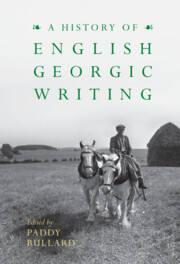Book contents
- A History of English Georgic Writing
- A History of English Georgic Writing
- Copyright page
- Contents
- Contributors
- A Note on National Designations
- Abbreviations
- Introduction
- Part I Turnings
- Part II Times
- Chapter 5 Jacobean Georgic
- Chapter 6 ‘Varieties too Regular for Chance’
- Chapter 7 Enlightenment, Improvement and Experimentation
- Chapter 8 Georgic, Romanticism and Complaint
- Chapter 9 Rural Labour in an Age of Industry
- Chapter 10 Labour Isn’t Working
- Chapter 11 Twentieth-Century Georgic
- Chapter 12 Rags and Tatters
- Part III Territories
- Bibliography
- Index
Chapter 9 - Rural Labour in an Age of Industry
William Cobbett and Some Contemporaries
from Part II - Times
Published online by Cambridge University Press: 01 December 2022
- A History of English Georgic Writing
- A History of English Georgic Writing
- Copyright page
- Contents
- Contributors
- A Note on National Designations
- Abbreviations
- Introduction
- Part I Turnings
- Part II Times
- Chapter 5 Jacobean Georgic
- Chapter 6 ‘Varieties too Regular for Chance’
- Chapter 7 Enlightenment, Improvement and Experimentation
- Chapter 8 Georgic, Romanticism and Complaint
- Chapter 9 Rural Labour in an Age of Industry
- Chapter 10 Labour Isn’t Working
- Chapter 11 Twentieth-Century Georgic
- Chapter 12 Rags and Tatters
- Part III Territories
- Bibliography
- Index
Summary
This chapter re-visits Raymond Williams’s imagined journey in ‘Three around Farnham’, from The Country and the City (1973), to explore the meanings of georgic in a period of rapid urbanisation and industrialisation. It suggests that William Cobbett might be read as a writer engaged with the georgic mode and shows how his writings on rural England contain recognisably pastoral and georgic themes, tropes and rhetorical strategies. It examines Cobbett’s attempts to inhabit the rural ideal through his various farming ventures before reading Rural Rides (1830) as a work in the georgic mode, realised through Cobbett’s detailed mapping of the English countryside. This parallels Cottage Economy (1821–1822), an attempt to take georgic away from elite literary culture and down to the level of the cottage. Finally, the chapter demonstrates how Cobbett’s later tours of industrial Britain imagine a union between agricultural and industrial workers as the only possibility for political reform.
Keywords
- Type
- Chapter
- Information
- A History of English Georgic Writing , pp. 197 - 214Publisher: Cambridge University PressPrint publication year: 2022

